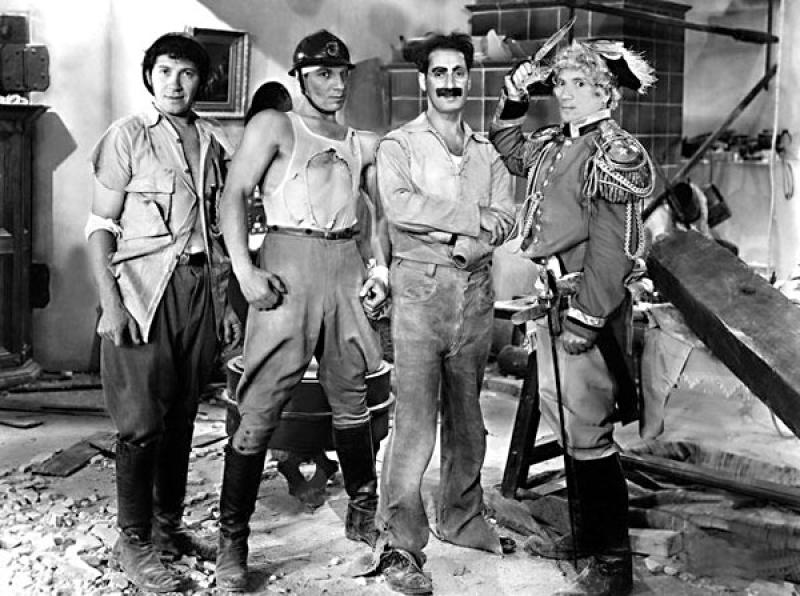6 Classic Movies That Have Been Banned

6 Classic Movies That Have Been Banned
These Films Didn't Make It Past the Censors

Photo of Marx Bros. Duck Soup was banned in Italy for its send up of fascism. Michael Ochs Archives / Getty Images
by Christopher McKittrick, ThoughtCo, Updated March 16, 2018
These days, with the right streaming service, it's possible to watch virtually any movie ever made. However, that obviously wasn't always the case, particularly when films were banned in a particular country or region. In the days before home video and digital distribution, banning a film in a particular area meant that audiences really couldn't see it—unless they traveled far enough outside of the ban.
While banning films is less common today, some countries (especially those without open access to the internet) continue to limit access to movies that authorities want to keep out of the public eye.
Generally, films have been banned by authorities for political or religious reasons, with the dominant political party or religious institution deeming the content of a film "offensive" or subversive and subsequently preventing the public from viewing the film.
In other cases, a film might be banned because its content is deemed obscene (nudity, violence, gore, etc.) This is not only done to "protect" audiences from gruesome material, but also to prevent potential copycat actions based on the material in the film.
Ultimately, studios want to avoid bans because it cuts into the worldwide box office earnings. In most cases today studios are willing to find a compromise instead of accepting a ban. For example, several U.S. films (such as "Django Unchained") agreed to extensive edits to get approval for release in China, while others are banned regardless.
These are six films that have been banned from cinemas for various reasons.
All Quiet on the Western Front (1930)

Universal Pictures
The film All Quiet on the Western Front, which was adapted from the famous Erich Maria Remarque novel, was considered a monumental success upon release and later won two Academy Awards. The epic depicts the horrors of World War I, and was released only a dozen years removed from that conflict (and only nine years before an even deadlier World War would engulf the globe).
Not every country appreciated this on-screen representation of World War I. The German Nazi Party believed that the film was anti-German and, after several screenings that were disrupted by Nazi brownshirts, All Quiet on the Western Front was banned. Similarly, it was banned in Italy and Austria for being anti-Fascist and in New Zealand and Australia for graphic content and being anti-war. The movie was also banned parts of France.
Curiously, the film was also banned in Poland — allegedly for being viewed as too pro-German.
All bans on the film have since been lifted, but in the immediate aftermath Hollywood was very concerned about releasing other films that would be banned in lucrative markets like Germany. Hollywood would not produce a clearly anti-Nazi feature until Warner Bros. released 1939's Confessions of a Nazi Spy (unsurprisingly, that film was banned by Germany and its allies).
Duck Soup (1933)

Paramount Pictures
The hilarious Marx Brothers frequently found their anarchic brand of comedy under fire for its ridiculousness — for example, their 1931 film Monkey Business was banned in Ireland out of concerns that it might encourage anarchy. Later in the 1930s, the Marx Brothers' movies also received a general ban in Germany because the brothers were Jewish.
The most significant ban that the brothers faced was for their 1933 comedic masterpiece Duck Soup. In the film, Groucho Marx is appointed leader of a small country named Freedonia and his wild regime soon puts him at odds with neighboring Sylvania. Italian dictator Benito Mussolini believed Duck Soup was an attack on his regime and banned the film in Italy, a fact that the Marx brothers were reportedly delighted about — because in fact they had intended the film as a send-up of fascist regimes like Mussolini's!
Some Like It Hot (1959)

United Artists
Bans in the United States are often conducted on the city- or state-level based on the views of local and civic authorities. Often, as a result, a film that seems perfectly reasonable to most can be viewed as objectionable by other communities.
Such is the case of the with Some Like It Hot, the classic comedy starring Tony Curtis, Jack Lemmon, and Marilyn Monroe. Much of the plot involves Curtis and Lemmon dressing as women to escape after bearing witness to a mob killing. However, the cross-dressing did not go over well in Kansas — during the initial release Some Like It Hot was banned in Kansas for being "disturbing."
A Clockwork Orange (1971)

Warner Bros.
Stanley Kubrick's A Clockwork Orange, which is based on the 1962 novel by Anthony Burgess, focuses on a juvenile delinquent who, after a spree of sexual and physical violence, is "cured" by undergoing intense psychological treatment. The nudity and violence in the film led to general bans in several countries, including Ireland, Singapore, South Africa, and South Korea.
Curiously, while A Clockwork Orange was not shown in the UK from 1973 to 2000, it was never officially banned in the UK. Kubrick himself withdrew the film from release in the UK after several copycat crimes occurred after the initial theatrical run. Kubrick and his family had received threats of violence for "inspiring" these crimes, so Kubrick withdrew the film for concerns of his and his family's safety. The film was finally "unbanned" after Kubrick's death in 1999.
Monty Python's Life of Brian (1979)

HandMade Films
A satire on religion by famed comedy troupe Monty Python was always bound to be controversial, but Life of Brian — about a man born in the manger next to Jesus and who is mistaken for the Messiah — was met with ire by religious authorities in many countries. Though the film always shows Jesus in a positive light, the satirical material in Life of Brian proved too much for some audiences.
Life of Brian was banned in Ireland, Malaysia, Norway, Singapore, South Africa, and some cities in the United Kingdom. Always eager to make light of such a situation, the Monty Python promoted the film as "The film so funny that it was banned in Norway!"
Some of the bans lasted for decades. For example, a ban on the film in Aberystwyth, Wales, was not lifted until 2009 — when a member of the cast (Sue Jones-Davies, who played Judas) was actually serving as mayor of the town!
Wonder Woman (2017)

Warner Bros.
Though Wonder Woman has not been out of cinemas long enough to be a true "classic" (though it's already considered by many fans to be a modern superhero classic), it demonstrates that even in the 21st century audiences are still sometimes prevented from seeing mainstream films.
2017's Wonder Woman grossed over $800 million worldwide and was one of the most successful movies of the year. However, audiences in Lebanon, Qatar, and Tunisia did not contribute to that massive box office because Wonder Woman was banned in those countries.
The primary reason for the ban in these countries was political. Wonder Woman star Gal Gadot is Israeli, and prior to her movie career she served in the Israel Defense Forces. Because of the significant political differences between these three countries and Israel, authorities did not want to promote a movie featuring someone who is so closely identified with Israel.
Who is online
626 visitors


